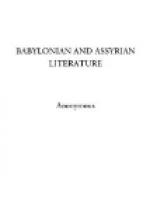[Footnote 18: The Hebrew month Ab.]
[Footnote 19: In the text, “Kummuhi” and “Muski.”]
[Footnote 20: Dr. Hincks was of opinion that Lamaman meant “nobody”; and that “Son of Lamaman” was a delicate way of indicating a man was of low origin. Norr. Dict., p. 690.]
[Footnote 21: Assyrian, “Khabur.” This may be the Chebar mentioned in the Prophet Ezekiel. Schultens, however (in his Geogr.), mentions another Chaboras which flows into the Tigris.]
[Footnote 22: In the north of Mesopotamia.]
[Footnote 23: Literally, to my back.]
[Footnote 24: Compare 2 Mace. vii. 7 for a somewhat similar proceeding. The custom may also be alluded to in Mic. iii. 3.]
[Footnote 25: Compare Ps. lxxiv. 3, “Lift up thy feet,” etc.]
[Footnote 26: About 882 B.C.]
[Footnote 27: Near the modern Diarbekir, on the road to the sources of the Supnat.]
[Footnote 28: In Armenia near the sources of the Tigris.]
[Footnote 29: Thus in 2 Kings xxv. 7 we read that the Chaldees “put out the eyes of Zedekiah.” Samson (Judges xvi. 21) was similarly treated. And the custom may be alluded to in Num. xvi. 14. It may be well to compare the treatment of children as recorded in Joshua xi. 14 with what we read in line 118. Horrible and ferocious as was the treatment of the conquered by the Israelites, they at least on that occasion were content with enslaving the children.]
COLUMN II
1 and their maidens I dishonored, the city I overthrew,
razed
and burned with fire,
In those days the cities
of the land of Nirbi
2 (and) their strong fortresses, I overthrew, demolished,
burned with fire:
from Nirbi I withdrew and to the city
Tuskha
3 I approached; the city of Tuskha I again occupied;
its
old fort I threw down:
its place I prepared, its dimensions
I took; a new castle
4 from its foundation to its roof I built, I completed,
I reared:
a palace for the residence
of My Royalty with doors of iki
wood I made;
5 a palace of brick from its foundations to its
roof I made, I
completed: a complete
image of my person of polished
stone I made; the history
6 of my surpassing nation and an account of my
conquests
which in the country
of Nairi I had accomplished I wrote
upon it; in the city
of Tuskha
7 I raised it; on suitable stone I wrote and upon
the wall I
fixed it; (then) the
men of Assyria, those who from the privation
of food to various countries
8 And to Rurie had gone up, to Tuskha I brought
back and
settled there:
that city to myself
9 I took; the wheats and barleys of Nirbi I accumulated
in
it; the populace of
Nirbi who before my arms had fled,
10 returned and accepted my yoke; of their towns,




